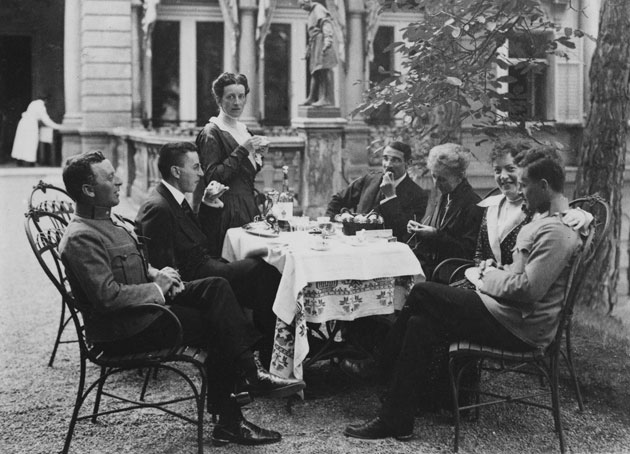An Exercise in Enlightenment: Why is the Wittgenstein Family of Interest to Us?
by Allan Janik
Answering this question involves reflecting upon the broader goals of the Initiative’s project. Our central interests involve casting light upon the crises and conflicts that are typical of the hugely complex nature of the problems in a globalized world. We seek to develop holistic perspectives on the issues that in one way or another tend to overwhelm citizens in democratic societies today. Ours is thus an exercise in enlightenment.
Vienna 1900, Wittgenstein’s Vienna, is particularly important to this project because the critical approach to modernity that developed around figures like Karl Kraus, Adolf Loos, Sigmund Freud, Robert Musil, to name just a few, has lost none of its relevance over the last hundred years. Indeed, the concept of reflective, self-critical Bildung that they advocated has become more important (and, if anything, rarer) in the meanwhile.
The culture of enlightenment that was part and parcel of Wittgenstein’s Vienna had a social and material basis that is an essential part of the story. This is where the family enters the picture. Focus on the Wittgenstein family should help us to get hold of a presupposition of cultural growth on the basis of Besitz und Bildung. This often cited but scarcely understood phrase refers the idea that self-realization through the accumulation of wealth carried social responsibility with it.
The Wittgensteins were, for all their uniqueness, typical representatives of Vienna’s “second society”, the elite, moneyed haute bourgeoisie, that formed a highly self-conscious oligarchy in Habsburg Vienna. This group was made up of some 200 financially interlocked and to a great extent socially intermarried families. Indeed, our modern conception of the nuclear family: father, mother, children and the immediate small circle of related siblings is misleading as a basis of comparison. We have to make an effort to understand the Family as the Viennese “second society” once did.
The upper middle class family, then, was a broadly related group of frequently multiply interrelated families, a family of families as it were. Thus the Wittgensteins were connected with the Franz family (leaders of the Protestant community) through more than one marriage. The same is true of their relationships with the Salzer family (one Salzer much concerned with his family was surprised earlier this year to realize that there was more than one Salzer connection in the Wittgenstein family). In referring to the Anglo-Jewish gentry this large scale agglomeration of relationships is sometimes referred to as a “cousinhood” (we also need to say something about the peculiarities of its Jewishness below). The term is appropriate here. It is the cousinhood that is interesting to the Wittgenstein Initiative in the plurality of its cultural achievements and not merely its individual members.
Surely Ludwig, Paul, and Gretl are extraordinary figures pure and simple but as we look to the cousinhood such figures seem to be everywhere. In order to see that we have to go back in time two generations to Jewish emancipation (such as it was in 1848).
Granddad Hermann Christian Wittgenstein was anything but a parvenu. He was born into the European Jewish elite, the so-called Hofjuden, who had financed Christian monarchs from time immemorial, in the way that the more famous Rothschilds and Montefiores had done. When he came to Vienna shortly after freedom of movement was permitted in the monarchy in the wake of the 1848 Revolutions, his circle of friends was positively extraordinary – far beyond anything his son Karl would achieve. It included the dramatist, Friedrich Hebbel, the astronomer Carl Ludwig von Littrow, the physiologist Ernst von Brücke and the philosopher-philologist, Hermann Bonitz. Little wonder that he would marry Fanny Figdor, daughter of one of Central Europe’s biggest bankers. She would befriend her cousin Joseph Joachim and his colleague Johannes Brahms would practically become part of the family too. One of Fanny’ sisters, Emelie, would marry Michael Hainisch, later president of Austria. Two other Figdors would also place their unmistakable stamp on Viennese culture: Albert, who was one of the most monumental and systematic art collectors who ever lived and Wilhelm, who would found the Vienna Vivarium, one of the first centers for biological research worldwide. When Karl Wittgenstein ceased playing the Prodigal Son, he married Leopoldine Kalmus, whose accomplishments as a pianist and deep concern for musical culture made her salon into the center of Viennese musical life. Leopoldine’s “cousins” Edwin and Alfred Kalmus became among the most prominent music publishers of their generation. The examples could be multiplied again and again.
The question of the Jewishness of the Wittgensteins – and the other families of the grand bourgeoisie – is one which inevitably comes up in discussion today (see Steven Beller’s classical study Vienna and the Jews 1867-1938). It is not easy to answer and many people are unhappy at the lack of clarity in this complex issue. Most people in this social strata had long ceased to practice Judaism by the turn of the century, if not long earlier. Many had become Protestants; some Catholic. One of the most prominent “assimilated” Jews Lazar Auspitz summed up their attitude as well as it can be: Judaism was “un pieux souvenir de famille.” These people were descendants of the followers of Moses Mendelssohn, the father of the Jewish Enlightenment, for which science and culture came to replace religion. They did not see themselves as Jews and were even occasionally capable of producing hostile critique of traditional encrusted “unenlightened” Jews. Little wonder that the first reaction of Hermine Wittgenstein and Helene Wittgenstein-Salzer at being told that they were subject to the Nuremberg Laws was dismay.
Be that as it may, what is important for the Wittgenstein Initiative is how the values of the Enlightenment came to pervade this cousinhood and in doing so helped to form our culture.
Prof. Dr. Allan Janik is Emeritus Professor of Cultural History and Philosophy at the universities of Vienna and Innsbruck and the Royal Instituten of Technology in Stockholm. He specializes in the cultural history of modern Austria and in philosophy. Together with Stephen Toulmin, he wrote Wittgenstein’s Vienna (1973).

